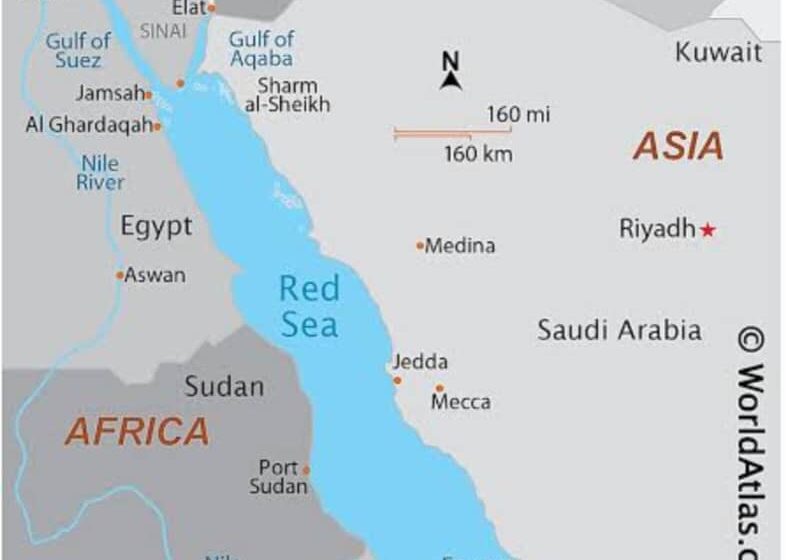
The Geopolitics of the Red Sea
The Geopolitics of the Red Sea
The possible conflict between Ethiopia and Eritrea has deeply entrenched geopolitical factors. These include the strategic location of Bab al-Mandab and the Suez Canal, the proxy wars between Saudi and Iran in Yemen, as well as oil and gas reserves in the region.
Bab al-Mandab and the Suez Canal
Bab al-Mandab is a strategic chokepoint at the southern entrance to the Red Sea. It is one of the busiest shipping lanes in the world, and it is also a vital waterway for global energy supplies.
Eritrea has two major ports, Massawa and Assab, which are located on the Bab al-Mandab Strait. This gives Eritrea significant leverage over Ethiopia, as it can control Ethiopia’s access to the sea. The United States, China, and other countries have military bases in Djibouti, which is located just across the Bab al-Mandab Strait from Eritrea.
Second, is the Suez Canal, which connects the Red Sea to the Mediterranean Sea. It allows ships to travel between Europe and Asia without having to circumnavigate the Cape of Good Hope. The Suez Canal is particularly important for the transportation of oil and gas. Over 10% of the world’s oil supply transits the Suez Canal each day. The canal is also important for the transportation of other goods, such as manufactured goods and food.
Both Ethiopia and Eritrea have a strategic interest in the Suez Canal. Ethiopia is located upstream of the Suez Canal, while Eritrea is located on the Red Sea coast. This gives both countries the ability to disrupt shipping in the Red Sea and the Suez Canal.
The Bab al-Mandab and the Suez Canal show the strategic location of the Red Sea with the possibility of multiple actors playing out in the possible conflict.
Proxy wars between Saudi and Iran
The conflict between Ethiopia and Eritrea is also inextricably linked to the wider geopolitical tensions in the region. Saudi Arabia and Iran are two of the most powerful countries in the Middle East, and they have been vying for influence in the Horn of Africa for decades. Saudi Arabia sees Ethiopia as a key ally in its efforts to contain Iran’s growing influence in the region. Iran, on the other hand, has been supporting Eritrea since the 1990s.
The conflict in Yemen has further complicated the geopolitical situation in the Horn of Africa. Saudi Arabia is leading a coalition of Arab countries that is fighting against the Houthi rebels in Yemen. The Houthis are backed by Iran. The conflict in Yemen has created a proxy war between Saudi Arabia and Iran, and this can play out in the possible war between Ethiopia and Eritrea.
Saudi Arabia is concerned about Iran’s growing influence in the Horn of Africa, and it sees Eritrea as a potential Iranian proxy. Iran, on the other hand, is interested in maintaining its ties with Eritrea in order to counter Saudi Arabia’s influence in the region.
This can even be further viewed in terms of the global geopolitical axis with Israel+Saudi+UAE+US on the one hand and Hama’s+Houthi+Iran on the other. Ethiopia will obviously be supported by the first. And, this deeply entrenched axis is not going away anytime soon.
Oil and Gas
Oil and gas are significant factors in the geopolitics of the possible conflict between Ethiopia and Eritrea. The Red Sea, which separates the two countries, is a major shipping route for oil and gas from the Middle East to Europe and the Americas. In addition, both Ethiopia and Eritrea have oil and gas reserves.
The oil and gas reserves in the Red Sea have attracted the interest of regional and international powers. Saudi Arabia, the United Arab Emirates, and Qatar have all invested in oil and gas exploration and production in the Red Sea. In addition, China has also invested heavily in oil and gas infrastructure in the region. The oil and gas reserves in the Red Sea are a source of competition between regional and international powers.
Saudi Arabia, Iran, the United Arab Emirates, Qatar, the United States, and China all have interests in the region. And, there is a possibility for a contracted proxy war.
References
Eritrea and Ethiopia: A Long-Running Rivalry. International Crisis Group, 10 December 2019.
The impact of the possible conflict between Ethiopia and Eritrea on the global oil and gas market. Brookings Institution, 2020.
The role of oil and gas in the geopolitics of the Red Sea. International Crisis Group, 2019.
The Suez Canal: A Strategic Waterway in a Volatile Region. Brookings Institution, 12 September 2019.
The Suez Canal: A Vital Waterway for Global Trade United States Energy Information Administration, 17 March 2020.
